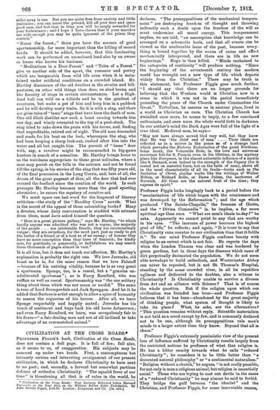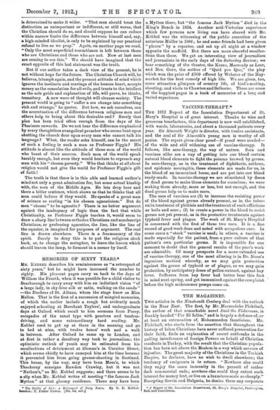CIVILIZATION AT THE CROSS ROADS.* PROFESSOR FIGGIS'S book, Civilization at
the Cross Roads, does not contain a dull page. It is full of fire; fall also, as it seems to us, of exaggeration. His subjects may be summed up under two heads. First, a contemptuous but intensely serious and interesting arraignment of our present civilization, in which he declares Christianity to have next to no part ; and, secondly, a fervent but somewhat partizan defence of orthodox Christianity. "The squalid fever of our time" is threatening all that is of value in the world, he
• Civilization at the Cross Roads: Four Lectures Delivered before Harvard Unirersito in the Year 1911, on the Wiltiam Belden Noble Foundation. By John Neville Figgie, Litt.D. London: Longman s and Co. [5e. net.]
declares. "The presuppositions of the mechanical tempera- ment" are destroying freedom of thought and throwing indirectly such a doubt upon the freedom of the will as must undermine all moral energy. This temperament implies, we are told, "an assumption that knowledge can be arranged on a schematic basis, and that all events can be viewed as the unalterable issue of the past, because every- thing is bound together by the nexus of cause and effect mechanically interpreted, and there are in life no new beginnings." Hope is thus killed. "Minds enchained to the categories of continuity" will produce nothing. "Since the beginning of the seventeenth century the modern world has wrought out a new type of life which departs widely from the Christian." There may be truth in this statement, but Professor Figgie goes much further. "I should say that there are no longer grounds for
believing that the Western world is Christian now in a sense in which it was not in the period immediately preceding the peace of the Church under Constantine the
Great." Tertullia.n, he assures us in another place, lived in a world as Christian as ours. The Christian Church has dwindled once more, he seems to imply, to a few convinced
enthusiasts, and once more the whole world lieth in darkness. In our author's mind the Dark Ages were full of the light of a true ideal, Medieval men, he says— "May not have always served God very well, but they knew that Ile was 'the chief end of man.' . . . Their ideals are reflected as in a mirror in the peace as of a strange land which pervades the Historic Eeclesiastica of the great Northum- brian monk, the Venerable Bede, in the love and universal reverence felt for S. Francis even in his lifetime, in the mystery plays like Everyman, in the almost autocratic influence of a mystic like S. Bernard, even indeed in the strength of the Papacy (for it rested not on material force, but on the faith of men), above all in the most characteristic of all its fruits—books such as Th. Invitation of Christ, similar works like the writings of Walter Hilton, or Richard Rolle, or Dame Julian, the anchoress of Norwich. All these are the natural fruit of the time; they express its spirit."
Professor Figgis looks longingly back to a period before the "secularisation of life which began with the renaissance and was developed by the Reformation " ; and the age which
produced "The Sainte-Chapelle," the .frescoes of Giotto, and the "Divine. Commedia " is, he implies, a far more spiritual age than ours. "What are men's ideals to-day?" he asks. Apparently we cannot point to any that are worthy in his eyes. "The increase of power becomes the highest goal of life," be reflects ; and again, "It is truer to say that Christianity runs counter to our civilization than that it fulfils it." To our mind Professor Figgie confuses beauty with religion to an extent which is not fair. He regrets the days when the London Thames was clear and was bordered by green gardens, but in those days the diseases which came of dirt perpetually decimated the population. We do not seem able nowadays to build cathedrals, and Westminster Abbey can never be repeated, but is not St. Thomas's Hospital, standing by the same crowded river, in all its repetitive ugliness and dedicated to the doubter, also a witness to Christianity ? Is Christianity unable to survive a divorce from Art and an alliance with Science P That is of course the whole question. But if the religion upon which our civilization was founded has been—and Professor Figgie believes that it has been—abandoned by the great majority of thinking people, what system of thought is likely to take its plaee P What, he asks, are the alternatives? "This question remains without reply. Scientific materialism is not held as a creed except by few, and is commonly declared not to be one, although its presuppositions rule men's minds to a larger extent than they know. Beyond that all is chaos."
Professor Figgis's extremely pessimistic view of the present loss of influence suffered by Christianity results largely from the restricted notions he professes of what that religion is. He has a bitter enmity towards what he calls "reduced Christianity" ; he considers it to be little better than "a decorated natural philosophy" or "a sentimental naturalism." "Religion without a church," he argues, "is not really possible, for not only is man a religious animal, but religion is essentially social." Those who are trying to cast out devils in the name of a "reduced Christianity" he may almost be said to forbid. They bridge the gulf between "the idealist" and the Christian, and Professor Figgie, for some inscrutable reason, is determined to make it wider. "That men should treat the distinction as unimportant or indifferent, or still worse, that the Christian should do so, and should suppose he can reduce within narrow limits the difference between himself and, say, a high-minded idealist, is only to be explained by our practical refusal to live as we pray." Again, on another page we read, "Only the most superficial resemblance is left between those who are Christians and those who are not. Now at last men are coming to see this." We should have imagined that the exact opposite of this last statement was the truth.
But if our author takes a dark view of the present, he is not without hope for the future. The Christian Church will, he believes, triumph again, and the present attitude of mind which ignores the instincts and cravings of the human heart, accepts money as the consolation for all evils, and trusts to the intellect as the sole guide and explanation of life, will prove, he thinks, transitory. A. new wave of thought will cleanse society. The present world is going to "suffer a sea change into something rich and strange," he quotes. But how, we ask ourselves, can the accentuation of the difference between religious men and others help to bring about this desirable end P Surely that plan has been tried often enough from the days of the Pharisees onwards. Do we not hear the difference emphasized by every thoughtless evangelical preacher who seems bent upon shutting the church door upon every man who cannot talk his language ? What, the reader asks himself, can be the secret of such a feeling in such a man as Professor Figgis P His attitude is almost like the attitude of those men of the world who boast of their success. Such men of the world speak harshly enough, but even they would hesitate to reproach any man with his "chosen poverty." Who that thinks at all about religion would not give the world for Professor Figgis's gift of faith !
The truth is that there is in this able and learned author's mind not only a great admiration for, but some actual kinship with, the men of the Middle Ages. He lets drop here and there a bitter sentence, which shows us that he thinks that all men could believe if they would. He speaks of a great man of science as resting "in his chosen agnosticism." But do men " choose " to be agnostic ? There is no better argument against the inadequacy of logic than the fact that while Christianity, as Professor Figgie teaches it, would seem to draw a sharp line between orthodox Christians and nondescript Christians, or professing agnostics, the line, like the line of the equator, is imagined for purposes of argument. The real line is drawn elsewhere. There is a freemasonry of the spirit. Surely to deny this is to put the religious clock back, or, to change the metaphor, to leave the leaven which should leaven the lump, to ferment in a corner by itself.







































































 Previous page
Previous page